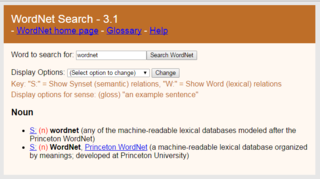Related Research Articles

WordNet is a lexical database of semantic relations between words that links words into semantic relations including synonyms,hyponyms,and meronyms. The synonyms are grouped into synsets with short definitions and usage examples. It can thus be seen as a combination and extension of a dictionary and thesaurus. While it is accessible to human users via a web browser,its primary use is in automatic text analysis and artificial intelligence applications. It was first created in the English language and the English WordNet database and software tools have been released under a BSD style license and are freely available for download from that WordNet website. There are now WordNets in more than 200 languages.
An idiom is a phrase or expression that largely or exclusively carries a figurative or non-literal meaning,rather than making any literal sense. Categorized as formulaic language,an idiomatic expression's meaning is different from the literal meanings of each word inside it. Idioms occur frequently in all languages;in English alone there are an estimated twenty-five thousand idiomatic expressions. Some well known idioms in English are spill the beans,it's raining cats and dogs,and break a leg.
Word-sense disambiguation is the process of identifying which sense of a word is meant in a sentence or other segment of context. In human language processing and cognition,it is usually subconscious.
In corpus linguistics,a collocation is a series of words or terms that co-occur more often than would be expected by chance. In phraseology,a collocation is a type of compositional phraseme,meaning that it can be understood from the words that make it up. This contrasts with an idiom,where the meaning of the whole cannot be inferred from its parts,and may be completely unrelated.

Charles J. Fillmore was an American linguist and Professor of Linguistics at the University of California,Berkeley. He received his Ph.D. in Linguistics from the University of Michigan in 1961. Fillmore spent ten years at Ohio State University and a year as a Fellow at the Center for Advanced Study in the Behavioral Sciences at Stanford University before joining Berkeley's Department of Linguistics in 1971. Fillmore was influential in the areas of syntax and lexical semantics.
FrameNet is a group of online lexical databases based upon the theory of meaning known as Frame semantics,developed by linguist Charles J. Fillmore. The project's fundamental notion is simple:most words' meanings may be best understood in terms of a semantic frame,which is a description of a certain kind of event,connection,or item and its actors.
In linguistics,troponymy is the presence of a 'manner' relation between two lexemes.
In lexicography,a lexical item is a single word,a part of a word,or a chain of words (catena) that forms the basic elements of a language's lexicon (≈ vocabulary). Examples are cat,traffic light,take care of,by the way,and it's raining cats and dogs. Lexical items can be generally understood to convey a single meaning,much as a lexeme,but are not limited to single words. Lexical items are like semes in that they are "natural units" translating between languages,or in learning a new language. In this last sense,it is sometimes said that language consists of grammaticalized lexis,and not lexicalized grammar. The entire store of lexical items in a language is called its lexis.
PropBank is a corpus that is annotated with verbal propositions and their arguments—a "proposition bank". Although "PropBank" refers to a specific corpus produced by Martha Palmer et al.,the term propbank is also coming to be used as a common noun referring to any corpus that has been annotated with propositions and their arguments.
A phraseme,also called a set phrase,fixed expression,idiomatic phrase,multiword expression,or idiom,is a multi-word or multi-morphemic utterance whose components include at least one that is selectionally constrained or restricted by linguistic convention such that it is not freely chosen. In the most extreme cases,there are expressions such as X kicks the bucket ≈‘person X dies of natural causes,the speaker being flippant about X’s demise’where the unit is selected as a whole to express a meaning that bears little or no relation to the meanings of its parts. All of the words in this expression are chosen restrictedly,as part of a chunk. At the other extreme,there are collocations such as stark naked,hearty laugh,or infinite patience where one of the words is chosen freely based on the meaning the speaker wishes to express while the choice of the other (intensifying) word is constrained by the conventions of the English language. Both kinds of expression are phrasemes,and can be contrasted with ’’free phrases’’,expressions where all of the members are chosen freely,based exclusively on their meaning and the message that the speaker wishes to communicate.
Beryl T. "Sue" Atkins was a British lexicographer,specialising in computational lexicography,who pioneered the creation of bilingual dictionaries from corpus data.
Patrick Wyndham Hanks was an English lexicographer,corpus linguist,and onomastician. He edited dictionaries of general language,as well as dictionaries of personal names.

Yorick Alexander Wilks FBCS was a British computer scientist. He was an emeritus professor of artificial intelligence at the University of Sheffield,visiting professor of artificial intelligence at Gresham College,senior research fellow at the Oxford Internet Institute,senior scientist at the Florida Institute for Human and Machine Cognition,and a member of the Epiphany Philosophers.

The Berlin-Brandenburg Academy of Sciences and Humanities,abbreviated BBAW,is the official academic society for the natural sciences and humanities for the German states of Berlin and Brandenburg. Housed in three locations in and around Berlin,Germany,the BBAW is the largest non-university humanities research institute in the region.
IndoWordNet is a linked lexical knowledge base of wordnets of 18 scheduled languages of India,viz.,Assamese,Bangla,Bodo,Gujarati,Hindi,Kannada,Kashmiri,Konkani,Malayalam,Meitei (Manipuri),Marathi,Nepali,Odia,Punjabi,Sanskrit,Tamil,Telugu and Urdu.

Martha Alice Hearst is a professor in the School of Information at the University of California,Berkeley. She did early work in corpus-based computational linguistics,including some of the first work in automating sentiment analysis,and word sense disambiguation. She invented an algorithm that became known as "Hearst patterns" which applies lexico-syntactic patterns to recognize hyponymy (ISA) relations with high accuracy in large text collections,including an early application of it to WordNet;this algorithm is widely used in commercial text mining applications including ontology learning. Hearst also developed early work in automatic segmentation of text into topical discourse boundaries,inventing a now well-known approach called TextTiling.
The Bulgarian WordNet (BulNet) is an electronic multilingual dictionary of synonym sets along with their explanatory definitions and sets of semantic relations with other words in the language.
Elisabeth Piirainen,,was a German linguist and philologist. After studying linguistics in Münster,Amsterdam,and Helsinki,she received her PhD in 1970 at the University of Münster. Afterwards she worked as an editor for German Language at the University of Jyväskylälocated in central Finland. In 1963 she met the Finnish scholar of German language,Ilpo Tapani Piirainen,and married him in 1967. Since 1975,she was in charge of various projects related to Low German philology. From 2006 to 2010 she was a member of the Scientific Council of the European Society of Phraseology (Europhras). She has been an active scholar in phraseology,with a broad European scope. Fifty of her publications related to proverbs are listed by Wolfgang Mieder in his two-volume bibliography on paremiology and phraseology.
UBY is a large-scale lexical-semantic resource for natural language processing (NLP) developed at the Ubiquitous Knowledge Processing Lab (UKP) in the department of Computer Science of the Technische Universität Darmstadt . UBY is based on the ISO standard Lexical Markup Framework (LMF) and combines information from several expert-constructed and collaboratively constructed resources for English and German.

Carita Paradis is a Swedish linguist,and Professor of English Language and Linguistics at Lund University.
References
- 1 2 "Fellbaum receives $1.6 million award for linguistics research". Princeton University. November 28, 2001. Retrieved May 5, 2019.
At Princeton, she is one of the creators of WordNet, a database of English words that are linked to each other according to their meanings...Fellbaum received her Ph.D. in linguistics from Princeton. After several teaching and research positions, she returned to Princeton to work as a research scientist in 1987.
- ↑ Gershgorn, George (July 26, 2017). "The data that transformed AI research—and possibly the world". Quartz. Retrieved May 5, 2019.
Having read about WordNet's approach, Li met with professor Christiane Fellbaum, a researcher influential in the continued work on WordNet, during a 2006 visit to Princeton.
- ↑ "the Board – Global WordNet Association" . Retrieved 2022-02-02.
- ↑ "NACLO at Princeton". lingclub.mycpanel.princeton.edu. Retrieved 2022-02-02.
- ↑ "Computer Science Bibliography - Christiane Fellbaum". DBLP.
- ↑ "The Wolfgang Paul Award". Humboldt Foundation. 2001. Retrieved July 22, 2020.
The Wolfgang Paul Award ... offered foreign award winners (13 males and one female) the opportunity to pursue their research projects free from administrative constraints at a research institution in Germany and to build up their own working groups of highly qualified junior researchers.
- ↑ "Christiane Fellbaum: Forscherpreis für die Hebung des Sprachschatzes (Christiane Fellbaum: Research award for the enhancement of the language treasure)". Wissenschaft.de (in German). November 7, 2001. Retrieved July 22, 2020.
Ihr Preisgeld will Fellbaum in ein dreijähriges Projekt der Berlin-Brandenburgischen Akademie der Wissenschaften stecken, das „Digitale Wörterbuch der Deutschen Sprache des 20. Jahrhunderts". Dieses elektronische Lexikon aus mehr als 500 Millionen Wörtern soll später einmal als Datenbank zugänglich sein. Seine Grundlage ist die deutsche Sprache der vergangenen hundert Jahre – ein repräsentativer Querschnitt, zusammengestellt aus Literatur, Zeitungsdeutsch, Fachbuchsprache, Werbetexten und niedergeschriebener Umgangssprache. (Fellbaum intends to use her prize money in a three-year project of the Berlin-Brandenburg Academy of Sciences, the "Digital Dictionary of the German Language of the 20th Century". This electronic lexicon made up of more than 500 million words will later be accessible as a database. It is based on the German language of the past hundred years - a representative cross-section composed of literature, newspaper German, textbook language, advertising texts and written colloquial language.)
- ↑ "Kollokationen im Wörterbuch: Ziel und thematische Schwerpunkte des Projekts (Collocations in the Dictionary: The aim and thematic focus of the project)" (in German). Berlin-Brandenburg Academy of Sciences and Humanities. Retrieved July 22, 2020.
Das durch den Wolfgang Paul-Preis der Alexander von Humboldt-Stiftung geförderte Projekt „Kollokationen im Wörterbuch" unter Leitung der Preisträgerin Christiane Fellbaum konzentriert sich auf einen ausgewählten Bereich im weiten Spektrum der festen Wendungen, auf Verb-Nomen-Verbindungen idiomatischen Charakters, wie es z. B. eins hinter die Löffel bekommen oder etwas auf die hohe Kante legen sind. Die komplexe semantische und syntaktische Analyse einer möglichst großen Anzahl deutscher Verb-Nomen-Idiome sowie ihre lexikographische Erfassung sind die Hauptziele des Projekts. (The project "Collocations in the Dictionary", funded by the Alexander von Humboldt Foundation's Wolfgang Paul Prize and directed by award winner Christiane Fellbaum, focuses on a selected area in the broad spectrum of fixed phrases, on verb-noun combinations of idiomatic character, such as this e.g. 'get one behind the spoons' or 'put something on the high edge.' The main goals of the project are the complex semantic and syntactic analysis of a large number of German verb-noun idioms as well as their lexicographical recording.)
- 1 2 "ELRA Antonio Zampolli Prize: Outstanding Contributions to the Advancement of Language Resources and Language Technology Evaluation within Human Language Technologies". European Language Resources Association. Retrieved July 22, 2020.
To reflect Antonio Zampolli's specific interest in our field, the Prize will be awarded to individuals whose work lies within the areas of Language Resources and Language Technology Evaluation with acknowledged contributions to their advancements. The ELRA Antonio Zampolli Prize was awarded to:...Christiane Fellbaum and George A. Miller, from Princeton University, Princeton (USA), at LREC 2006, in Genoa.